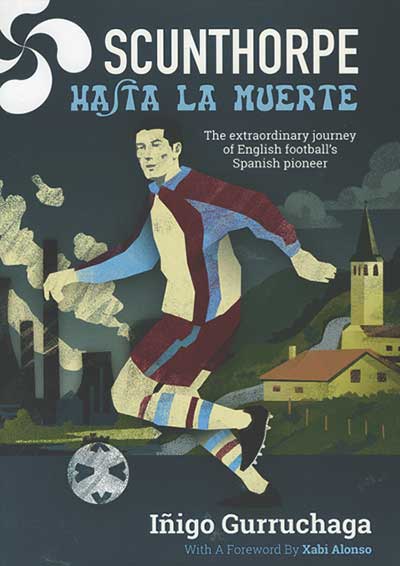
The extraordinary journey of English football’s Spanish pioneer
De Coubertin Books, £14.99
Reviewed by William Abbs
From WSC 361, March 2017
Buy this book

The extraordinary journey of English football’s Spanish pioneer
De Coubertin Books, £14.99
Reviewed by William Abbs
From WSC 361, March 2017
Buy this book
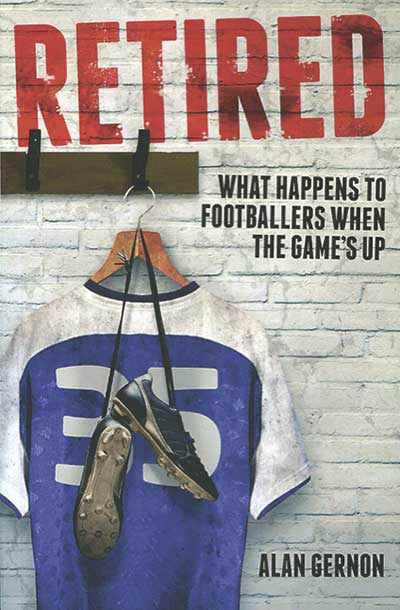 What happens to footballers when the game’s up
What happens to footballers when the game’s up
by Alan Gernon
Pitch Publishing, £9.99
Reviewed by Tim Springett
From WSC 356 October 2016
After reading the back cover blurb, where this account of footballers’ lives is described as “the ultimate where are they now”, one is prepared for a horrifying catalogue of alcohol and drug addiction, marriage break-ups, disability, bankruptcy, prison sentences and suicides. Perhaps fortunately, the content doesn’t truly warrant this apocalyptic preview.
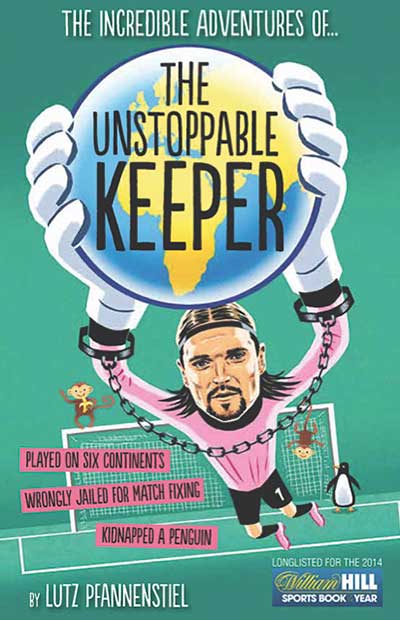 by Lutz Pfannenstiel
by Lutz Pfannenstiel
Vision Sports, £12.99
Reviewed by Jon Matthias
From WSC 344 October 2015
The slogans on the cover indicate that this is more than a journeyman footballer’s lifestory. “Died on the pitch”, “Kidnapped a penguin”, “Played on six continents”, “Wrongly jailed for match-fixing”, “Lived in an igloo”, “Played against Beckham” and so on. The igloo, it turns out, is a throwaway reference about a stunt to raise awareness of climate change.
What really stands out throughout Lutz Pfannenstiel’s story is his naivety, which seems undiminished after several years. Born in Bavaria in 1973, his globetrotting career began aged 19 when he met an “agent” and flew to Malaysia for a pro contract that never materialised. Fifteen years later he is recruited for a new super-club in Armenia, but the money runs out before the season starts.
Being overly trusting led to his match-fixing conviction and five-month prison sentence in Singapore. One night he was followed home by a fan who had recognised him in a restaurant. Normal people might be suspicious of that but Pfannestiel befriended the fan, who almost inevitably worked for a betting syndicate. Pfannestiel thought they had just been chatting about football, but when the friend gets busted by the Singaporean Corrupt Practices Investigation Bureau he says Pfannenstiel was supplying information. The experience of prison is not overly elaborated, but the bare details are horrible enough.
The book is reasonably well written (possibly due to the assistance of journalist Christian Putsch), but padded out by cliches and familiar facts about places he has visited. It only takes eight pages before he says you have to be mad to be a goalkeeper. The Premier League, meanwhile, is every professional’s “utopian dream”, even though Pfannenstiel was barely connected to it, barring a season without playing at Nottingham Forest. With a charming lack of self-awareness, he gives a potted history of legendary German goalkeeper Bert Trautmann’s experience in England before saying he couldn’t possibly compare himself to Trautmann. Of course, he promptly then goes on to do exactly that.
Pfannenstiel has been through trauma. His heart stopped three times after a hefty challenge in a game for Bradford Park Avenue (for whom he played 14 games in 2002-03) – he copes with it by going back to training a week later. He is less affected by his failed marriage and other relationships and there are some seedy womanising tales, including helping an English under-21 team avoid police charges of rape while on tour in Asia. His lack of awareness prevents him from realising how these stories implicate him.
Still, Pfannenstiel has plenty of interesting observations to make. He reckons at least a dozen Bundesliga players are gay; North American soccer crowds “just came to the stadium to eat” – one game in Calgary is ignored by the crowd, who are watching a Stanley Cup ice hockey game on the big screen instead. Everywhere, though, has “lovely people”, the fans are great and he’d love to go back. Recently Pfannenstiel set up Global FC, a charity highlighting the threat of climate change which he hopes will get people seriously addressing the issue. Sadly, it’s hard not to think this is his trademark naivety on display again.
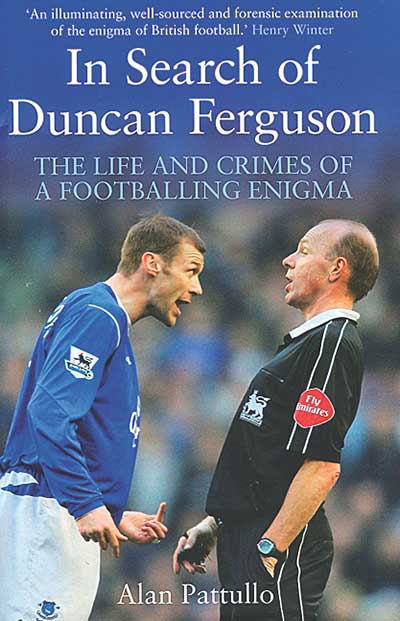 The life and crimes of
a footballing enigma
The life and crimes of
a footballing enigma
by Alan Pattullo
Mainstream, £18.99
Reviewed by Archie MacGregor
From WSC 336 February 2015
For someone who so determinedly shunned the media throughout his playing career Duncan Ferguson had quite a knack for grabbing headlines. The two were intrinsically related of course and contributed to him polarising opinion like few other Scots-born players have in recent decades, with perhaps only Graeme Souness ahead in the queue. This book lays bare not only justifications for his brooding hostility towards the press pack but also in turn how such unwillingness to explain himself fuelled antipathy towards him, especially in Scotland.
For those with strongly held opinions over whether Ferguson was a chronic underachiever with delinquent tendencies or a mixed-up kid who just needed to feel appreciated it’s unlikely this thoughtful and even-handed appraisal by Alan Pattullo will persuade them to change camps. Among the undecided there is simply just a lot more to ruminate over.
On the playing side the book chronicles Ferguson’s emergence as an exciting prospect at Dundee United, a then record-breaking £4 million transfer fee when he moved to Rangers in 1993, his failure there and the headbutt on Raith Rovers’ Jock McStay that led to a short jail sentence, a smattering of generally underwhelming international appearances and finally rejuvenation of sorts, eight sendings-off and near folk-hero status in two spells at Everton. Off the field Ferguson also emerges as no less paradoxical. For every interviewee testifying that he was “fun”, “sensitive” or had “a heart of gold” there is another portraying him as a “hellraiser”, “cruel” or “difficult to like”.
It’s hard not to escape the view that Ferguson’s early experiences under the successful but authoritarian Jim McLean at Tannadice shaped his seemingly ambivalent attitude towards the game. Along with notoriously long contracts to tie players down, there were results-driven pay packages with low basic wages topped up with relatively handsome appearance and win bonuses. This bred a “brutal” culture within the club where players competed ferociously with one another to make sure they were in the matchday squads. Newcomers were treated as unwelcome potential rivals and details of how Ferguson once humiliated a young German trialist by cutting up his suit in the dressing room make for particularly uncomfortable reading.
His penchant for getting into trouble ultimately led to a spell in Barlinnie prison. This was viewed as harsh by some but three previous convictions for assault prior to the McStay incident hardly stood him in good stead in court. However no one in the book offers any support for the SFA also seeking to impose a 12-game ban as its own punishment – a move that wholly soured Ferguson’s relations with the Association and all but extinguished his desire to play for Scotland.
It was letters of support from Everton fans, including one from a young Wayne Rooney, that Ferguson credits with keeping him going through those dark days and helped forge the strong relationship he has with the club to this day. Pattullo, like others who have taken a keen interest in his tumultuous career, could barely imagine him ever becoming a coach but there he is, an integral part of Roberto Martínez’s back-up team at Goodison Park. Heavens he’s even started speaking to the press occasionally. Maybe the autobiography will be next.
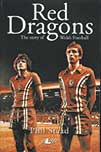 The story of Welsh football
The story of Welsh football
by Phil Stead
Y Lolfa, £14.95
Reviewed by Huw Richards
From WSC 319 September 2013
The condition of Welsh football is often serious but never dull, and the same can be said of Phil Stead’s engagingly readable chronicle. It is history as one thing after another, stronger on anecdote than analysis. The prose is more solid than stylish but with flourishes such as the characterisation of Jerry Sherman, briefly and disastrously Newport County’s owner, as having “the shifty-eyed evasiveness of a potion seller at a wild west show”.
Clubs are not neglected. We learn how Wrexham got their “Robins” nickname, that Cardiff possibly sacrificed the 1924 League title to Wales call-ups and that West Ham’s “Bubbles” anthem may have been borrowed from Swansea – but this is essentially the story of the Wales team and the Football Association of Wales (FAW).
The anecdotal style works well in the early years. It introduces debonair goalkeeper Leigh Roose, who dated music hall star Marie Lloyd and conceded a Scottish winner because he was talking to a spectator, and an earlier keeper who played against England with his forearms in plaster. There are two one-armed players, a schoolmaster accidentally shot dead by a pupil and evidence of the national surname shortage, with different players called Oswald Davies on consecutive pages. One FAW secretary is imprisoned for forgery and its second president is sacked for providing insufficient support – he was the nephew of the MP and magistrate who became founding president after licensing a pub lock-in at the first meeting.
Running themes do emerge. The FAW are perennially skint, so opt for income over team priorities in locating key qualifiers. They are beset by English club obstructionism over player release, localised factionalism – Oswestry v Wrexham prefiguring Swansea v Cardiff – and they treat Llanelli’s ambitions as unsympathetically in 1958 as in 2013.
They are baffled by foreign travel. Players routinely forget passports and it is hard to forgive the official who could have averted Vinnie Jones’s Wales debut, but let him play with limited documentation. The infamous incident when player Gil Reece was bumped from a flight packed with committee men is merely the culmination of traditions exemplified by taking only 18 players, but 25 officials including the FAW secretary’s sister, to the 1958 World Cup. And then there are the qualification near-misses, that litany of dodgy Scottish penalties and doped-up Russians for which the sad but inescapable explanation is that even good Wales teams are usually not quite good enough.
Red Dragons really should have an index but there are few factual glitches. Stead elevates Wrexham to Division Two 45 years too early, while the Trevor Ford who gave vital evidence at the manslaughter trial after a South Wales Transport player died on the pitch in 1934 was almost certainly not the rumbustious centre-forward, ten at the time, but his father.
But these are minor quibbles. Stead doubtless once dreamed of playing for Wales, but with this book serves his nation better than many who achieved that ambition.